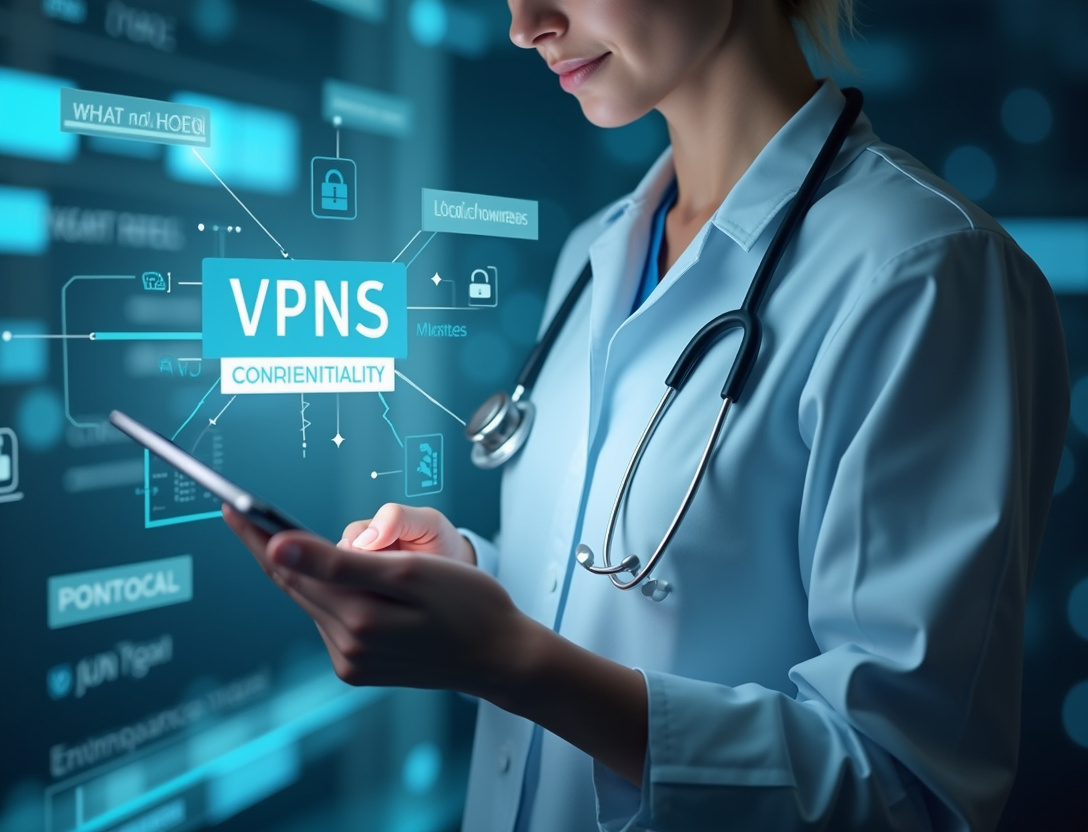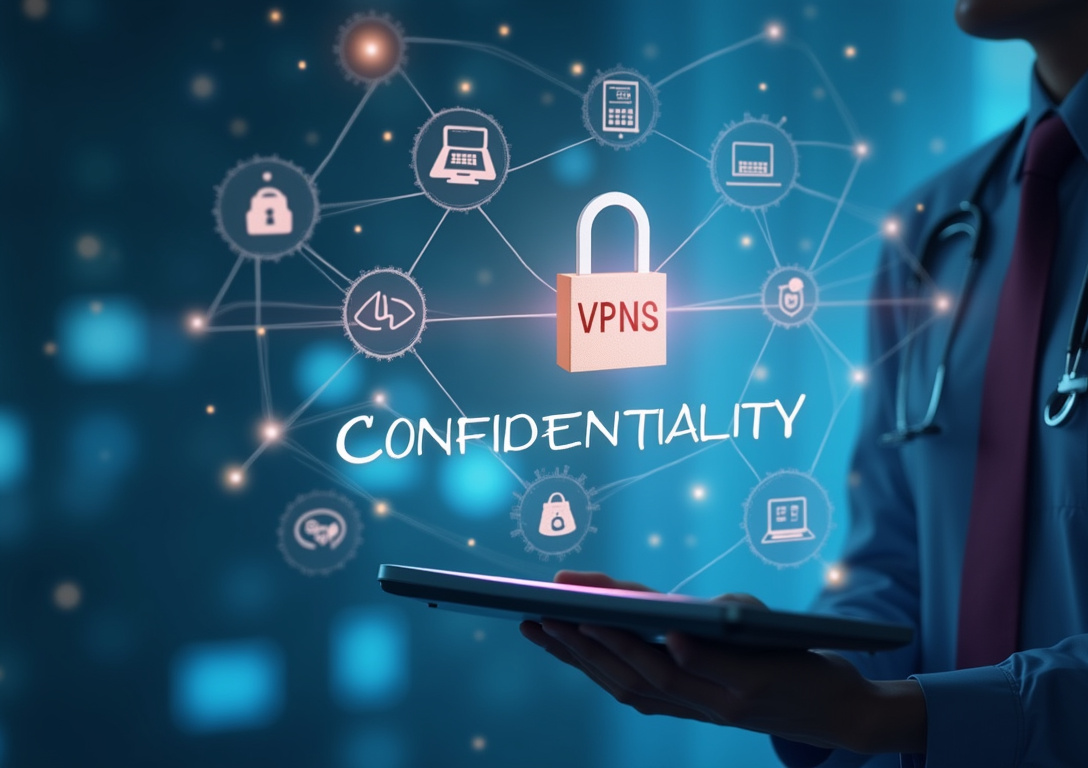VPNs and Remote Healthcare: Securing Telemedicine

Table of Contents
Introduction to VPNs in Telemedicine
The proliferation of digital technologies has ushered in a new era in healthcare, with telemedicine emerging as a transformative force. Telemedicine transcends geographical barriers, enabling patients to connect with healthcare providers remotely, access specialized consultations, and manage chronic conditions from the comfort of their homes. This paradigm shift has been accelerated by advancements in internet connectivity, video conferencing, and mobile devices, empowering healthcare professionals to deliver care in innovative ways.
However, the convenience and accessibility of telemedicine also introduce significant security and privacy challenges. The transmission of sensitive patient data over digital networks exposes it to potential threats, necessitating robust security measures to safeguard confidentiality, integrity, and availability. This article delves into the critical role of Virtual Private Networks (VPNs) in securing telemedicine, focusing on how these technologies create secure, encrypted channels for transmitting patient information.
We will explore the benefits of VPNs in enhancing remote healthcare security, ensuring compliance with regulatory standards, and fostering trust between patients and providers. Furthermore, we will examine the essential features of VPNs ideal for telemedicine applications, enabling healthcare organizations to make informed decisions and implement effective security strategies. The rise of telemedicine has expanded the attack surface for cybercriminals, creating new opportunities for data breaches and security incidents.
Unlike traditional in-person consultations, telemedicine relies on the internet, which is inherently a public and insecure network. Without proper security measures, patient data can be intercepted, stolen, or compromised during transmission. This can lead to severe consequences, including identity theft, financial loss, reputational damage, and violation of patient privacy.
The sensitive nature of healthcare data makes it a prime target for cyberattacks, as medical records often contain valuable information such as social security numbers, insurance details, medical histories, and prescriptions. This information can be used for a variety of malicious purposes, including fraud, blackmail, and identity theft. Moreover, data breaches in telemedicine can have a significant impact on patient trust and confidence.
Patients are more likely to engage in telemedicine if they feel that their data is secure and protected. A data breach can erode this trust, discouraging patients from seeking remote healthcare services and potentially impacting their health outcomes. [Keyword: telemedicine VPN] offers a comprehensive solution to these security challenges, providing a secure and encrypted connection for telemedicine sessions.
A VPN creates a virtual tunnel that encrypts all data transmitted between the patient's or provider's device and the VPN server. This encryption scrambles the data, rendering it unreadable to anyone without the proper decryption key. Even if the data is intercepted, it cannot be deciphered, ensuring that sensitive patient information remains confidential.
In addition to encryption, a VPN also masks the user's IP address, providing an additional layer of anonymity. An IP address is a unique identifier that can be used to track a user's location and online activity. By routing internet traffic through a VPN server, the user's real IP address is hidden, replaced by the IP address of the VPN server.
This makes it more difficult for cybercriminals to track and target individuals or healthcare organizations. The combination of encryption and IP masking makes VPNs an essential tool for securing telemedicine sessions and protecting patient data from unauthorized access. By implementing a robust VPN solution, healthcare providers can demonstrate their commitment to data security and patient privacy, fostering trust and confidence in their remote healthcare services.
This trust is crucial for the continued growth and success of telemedicine, enabling it to reach more patients and improve healthcare outcomes.
Benefits of VPNs for Healthcare Providers
The core function of a VPN in telemedicine lies in its ability to establish a secure, encrypted tunnel for data transmission. This encrypted tunnel acts as a protective barrier, shielding sensitive patient information from prying eyes and potential cyber threats. Encryption is the process of transforming readable data, known as plaintext, into an unreadable format called ciphertext.
This transformation is achieved using complex algorithms and encryption keys, making the data incomprehensible to anyone who does not possess the correct key. When a VPN is activated, all data transmitted between the patient's device and the healthcare provider's server is automatically encrypted. This includes video consultations, electronic medical records (EMRs), lab results, prescriptions, and any other type of sensitive health information exchanged during a telemedicine session.
This encryption ensures that even if a malicious actor intercepts the data, they will be unable to decipher it and gain access to the confidential information. The strength of the encryption used by the VPN is a critical factor in determining its security. Strong encryption algorithms, such as Advanced Encryption Standard (AES) with a 256-bit key, provide a high level of protection against brute-force attacks and other decryption attempts.
Healthcare providers should ensure that the VPN solution they choose utilizes robust encryption protocols to safeguard patient data. Furthermore, VPNs enhance [keyword: remote healthcare security] by masking the user's IP address. An IP address is a unique numerical identifier assigned to every device connected to the internet.
It reveals the user's location and can potentially be used to track their online activities. In the context of telemedicine, exposing the IP address of a patient or healthcare provider could leave them vulnerable to targeted attacks and surveillance. By routing internet traffic through a VPN server, the user's real IP address is concealed and replaced with the IP address of the VPN server.
This makes it more difficult for cybercriminals to identify and target individuals or healthcare organizations. The masking of the IP address also provides an additional layer of anonymity, protecting patient privacy and preventing unauthorized tracking of their online activities. In addition to encryption and IP masking, VPNs offer a range of other security features that are beneficial for telemedicine.
Many VPNs incorporate built-in firewalls that act as a first line of defense against unauthorized access to devices. These firewalls monitor incoming and outgoing network traffic, blocking any suspicious connections and preventing hackers from penetrating the system. Some VPNs also provide malware protection, scanning files and websites for malicious software and blocking access to infected sites.
This helps to prevent malware from infecting devices and compromising patient data. Another crucial aspect of VPN security is the choice of VPN protocols. VPN protocols are the underlying technologies used to establish and maintain a secure connection between the user's device and the VPN server.
Different protocols offer varying levels of security and performance. Common VPN protocols include OpenVPN, IKEv2/IPsec, WireGuard, and L2TP/IPsec. OpenVPN is widely regarded as one of the most secure and reliable protocols, offering strong encryption and flexibility.
IKEv2/IPsec is another popular protocol known for its speed and stability, making it suitable for mobile devices. WireGuard is a relatively new protocol that is gaining traction due to its simplicity and high performance. L2TP/IPsec is an older protocol that is still supported by many devices, but it is generally considered less secure than OpenVPN and IKEv2/IPsec.
When selecting a VPN for telemedicine, healthcare providers should carefully consider the VPN protocols supported by the VPN provider. It is advisable to choose a VPN that supports OpenVPN or IKEv2/IPsec to ensure a high level of security and reliability.
Safeguarding Patient Data with VPNs
[Keyword: Online health protection] goes beyond simply encrypting data transmissions; it encompasses a comprehensive approach to securing the entire telemedicine ecosystem. This includes implementing robust security policies, training healthcare staff on cybersecurity best practices, and regularly auditing security systems to identify and address vulnerabilities. VPNs are a critical component of this comprehensive security strategy, but they should not be viewed as a standalone solution.
Healthcare organizations must adopt a layered security approach that integrates VPNs with other security measures to provide a multi-faceted defense against cyber threats. One essential aspect of online health protection is compliance with regulatory standards. Healthcare organizations are subject to strict regulations, such as the Health Insurance Portability and Accountability Act (HIPAA) in the United States, which mandates the protection of patient health information (PHI).
HIPAA requires covered entities to implement technical, administrative, and physical safeguards to ensure the confidentiality, integrity, and availability of PHI. VPNs can play a significant role in helping healthcare providers meet their HIPAA obligations by providing a secure and encrypted channel for transmitting PHI. However, simply using a VPN is not enough to ensure HIPAA compliance.
Healthcare organizations must also implement other safeguards, such as access controls, audit trails, and data backup and recovery procedures. Another crucial element of online health protection is user education and training. Healthcare staff must be trained on how to identify and avoid phishing scams, malware attacks, and other cyber threats.
They should also be educated on the importance of following security policies and procedures, such as using strong passwords, protecting devices from unauthorized access, and reporting any suspicious activity. VPNs can help to mitigate some of the risks associated with user error, but they cannot eliminate them entirely. Ultimately, the human element is a critical factor in determining the overall security of the telemedicine ecosystem.
In addition to regulatory compliance and user education, healthcare organizations should also conduct regular security audits and vulnerability assessments to identify and address weaknesses in their security systems. These audits should assess the effectiveness of existing security controls, identify potential vulnerabilities, and recommend remediation measures. VPNs should be included in these audits to ensure that they are properly configured and functioning as intended.
Furthermore, healthcare organizations should implement intrusion detection and prevention systems (IDPS) to monitor network traffic for malicious activity and automatically block or mitigate any detected threats. IDPS can help to detect and respond to cyberattacks in real-time, minimizing the potential damage. Choosing the right [keyword: VPN for telehealth] is a critical decision for healthcare providers.
Not all VPNs are created equal, and some VPNs are better suited for telemedicine applications than others. When selecting a VPN for telehealth, healthcare providers should consider the following factors: Security: The VPN should use strong encryption protocols, such as AES-256, and support secure VPN protocols, such as OpenVPN or IKEv2/IPsec. Privacy: The VPN provider should have a clear and transparent privacy policy that outlines how they collect, use, and protect user data.
The VPN provider should not log user activity or share data with third parties. Reliability: The VPN should provide a stable and reliable connection to ensure that telemedicine sessions are not interrupted. Speed: The VPN should not significantly slow down internet speeds.
Healthcare providers should test the VPN's performance before deploying it to ensure that it meets their needs. Ease of Use: The VPN should be easy to set up and use, even for non-technical users. Compliance: The VPN provider should be willing to sign a Business Associate Agreement (BAA) to ensure HIPAA compliance.
Cost: The VPN should be affordable and provide good value for the money. By carefully considering these factors, healthcare providers can choose a VPN that meets their specific needs and helps to secure their telemedicine services.
VPNs for Service: Enhancing Security and Privacy
Implementing a VPN solution within a telemedicine framework requires careful planning and execution to ensure seamless integration and optimal security. It's not merely about subscribing to a VPN service; it involves configuring the VPN, training staff on its usage, and establishing protocols for managing the secure connections during telemedicine sessions. The initial step involves selecting a VPN service that aligns with the specific needs of the healthcare provider and their patients.
This includes considering the factors outlined previously – security protocols, privacy policies, reliability, speed, ease of use, compliance readiness, and cost-effectiveness. Once a suitable VPN is chosen, the next step is the configuration process. This typically involves installing VPN client software on the devices used for telemedicine, such as computers, tablets, and smartphones.
The VPN client software establishes a secure connection to the VPN server, encrypting all data transmitted between the device and the server. Careful configuration of the VPN client is crucial to ensure that it is properly protecting data. This includes selecting the appropriate encryption protocols, configuring the firewall settings, and enabling features such as kill switch, which automatically disconnects the internet connection if the VPN connection drops, preventing unencrypted data from being transmitted.
Furthermore, [keyword: encrypted sessions] are not consistently secure unless proper authentication methods are in place. Multi-factor authentication (MFA) adds an extra layer of security by requiring users to verify their identity through multiple channels, such as a password and a one-time code sent to their mobile device. This makes it much more difficult for unauthorized individuals to gain access to VPN accounts, even if they have stolen or guessed the password.
Healthcare providers should strongly consider implementing MFA for all VPN users to enhance the security of their telemedicine sessions. Staff training is another vital aspect of VPN implementation. Healthcare professionals need to be educated on how to use the VPN software correctly, understand its limitations, and recognize potential security threats.
This training should cover topics such as: How to connect and disconnect from the VPN. How to verify that the VPN connection is active. How to troubleshoot common VPN issues.
How to identify phishing scams and malware attacks. How to report suspicious activity. Regular refresher training should also be provided to ensure that staff remains up-to-date on the latest security threats and best practices.
In addition to staff training, healthcare providers should also develop clear policies and procedures for managing VPN connections during telemedicine sessions. This includes establishing guidelines for: Who is authorized to use the VPN. When the VPN must be used (e.g., for all telemedicine sessions).
How to handle situations where the VPN connection is unstable or unavailable. What to do if a security breach is suspected. These policies and procedures should be documented and communicated to all relevant staff members.
Ongoing monitoring and maintenance are essential to ensure the continued effectiveness of the VPN solution. Healthcare providers should regularly monitor the VPN's performance, looking for signs of instability or security breaches. They should also keep the VPN software up-to-date with the latest security patches to protect against newly discovered vulnerabilities.
Regular security audits should be conducted to assess the effectiveness of the VPN implementation and identify areas for improvement. These audits should be performed by qualified security professionals who have experience in healthcare cybersecurity. Finally, it's important to remember that VPNs are just one piece of the puzzle when it comes to securing telemedicine.
Healthcare providers should also implement other security measures, such as firewalls, intrusion detection systems, and data encryption, to provide a layered defense against cyber threats.
The Future of VPNs in Subscription Services
The selection of a VPN service for telemedicine should not be a hasty decision, but rather a deliberate process that involves careful evaluation and comparison of various services. The market is saturated with VPN providers, each touting its unique features and benefits. However, not all VPNs are created equal, and some are better suited for the specific requirements of remote healthcare than others.
A crucial aspect of comparing VPN services is assessing their security infrastructure and encryption capabilities. Look for VPNs that offer robust encryption protocols such as AES-256, considered the gold standard in data protection. Also, verify that the VPN supports secure and reliable VPN protocols like OpenVPN, IKEv2/IPsec, or WireGuard.
These protocols have been thoroughly vetted by security experts and are known for their strong security and performance. Beyond the technical specifications, it's also essential to examine the VPN provider's privacy policy. A reputable VPN provider will have a clear and transparent privacy policy that outlines how they collect, use, and protect user data.
The policy should explicitly state that the VPN provider does not log user activity, monitor browsing history, or share data with third parties. Some VPN providers even undergo independent audits to verify their compliance with their stated privacy policies. This level of transparency is particularly important in the healthcare industry, where patient privacy is paramount.
Another critical factor to consider is the VPN's server network. A wide and geographically diverse server network provides several benefits. It allows users to connect to servers located closer to their physical location, resulting in faster and more reliable connection speeds.
It also enables users to bypass geo-restrictions and access content that may be blocked in their region. However, it's important to note that the size of the server network is not the only factor to consider. The quality and security of the servers are equally important.
Look for VPN providers that use secure and well-maintained servers, and that have implemented measures to protect their servers from cyberattacks. [Keyword: VPN for telehealth] is a growing need and the market is adapting, so you should verify the compliances needed. The user interface and ease of use are also important considerations, especially for healthcare providers who may not be technically savvy.
The VPN client software should be intuitive and easy to navigate, with clear instructions and helpful support resources. The process of connecting to a VPN server should be simple and straightforward, allowing users to quickly and easily secure their telemedicine sessions. Many VPN providers offer free trials or money-back guarantees, allowing users to test the service before committing to a long-term subscription.
Take advantage of these offers to try out different VPNs and see which one works best for your needs. Finally, consider the cost of the VPN service. VPN prices vary widely, depending on the features offered and the length of the subscription.
While it's tempting to choose the cheapest option, remember that you often get what you pay for. A cheaper VPN may offer weaker security, slower speeds, and less reliable support. It's generally worth paying a bit more for a reputable VPN provider that offers strong security, reliable performance, and excellent customer service.
In conclusion, securing telemedicine with a VPN is essential for protecting patient data and ensuring regulatory compliance. By carefully comparing VPN services and implementing a robust security strategy, healthcare providers can deliver remote healthcare services safely and effectively. As telemedicine continues to evolve, VPNs will remain a critical tool in safeguarding the privacy and security of both patients and providers.
Integrating a VPN into the workflow ensures that [keyword: telemedicine VPN] makes the online experience more secure, private and reliable for both doctor and patient, fostering trust in remote healthcare and leading to better health outcomes.
Stay Updated
Get the latest VPN news, tips, and exclusive deals to your inbox.




